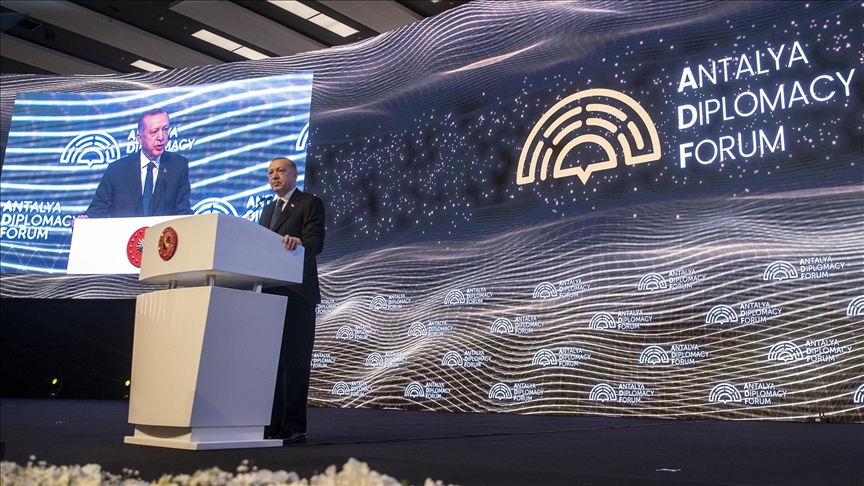'Stronger Western response to Crimea invasion could have averted Russia-Ukraine war': Turkiye
New global security structure must be formed to protect peace instead of status quo, serve all humanity, says President Erdogan

ANTALYA, Turkiye
Turkiye's president on Friday strongly criticized the Western world over Russia’s 2014 invasion of Ukraine’s Crimean Peninsula, saying that a stronger response then could have prevented Moscow’s current war on Ukraine.
"If the whole West had raised a clamor against the invasion of Crimea in 2014, would we be facing today's picture?" Recep Tayyip Erdogan said at the opening ceremony of the three-day Antalya Diplomacy Forum in southern Turkiye.
In 2014, Russia annexed Ukraine's Crimean Peninsula, a move widely viewed as illegal by the international community, including Turkiye and the UN General Assembly.
Ukraine has been forsaken in its righteous cause, said the Turkish president as the Russia-Ukraine war marks its 16th day.
“Our hope is that moderation and common sense will prevail and the weapons will fall silent as soon as possible," he said of the war.
While supporting Ukrainians’ legitimate struggle, Erdogan spoke out against demonizing Russian art, literature, or performers, saying: "Fascist practices against Russian nationals and culture in Western countries can never be acceptable."
Russia’s war on Ukraine, which began on Feb. 24, has drawn international condemnation, led to financial sanctions on Moscow, and spurred an exodus of global firms from Russia.
At least 564 civilians have been killed and 982 others injured in Ukraine since Russia launched the war on Feb. 24, the UN has said, also cautioning that conditions on the ground make it difficult to verify the true number.
Over 2.5 million people have fled to neighboring countries, with about 2 million more estimated to be displaced inside Ukraine, according to the UN refugee agency.
Reforming UN Security Council
Erdogan also reiterated his call to reform UN Security Council to make it more representative, a cause he has long championed using the motto: "The world is bigger than five."
“A new global security architecture, which will protect peace as opposed to the status quo, which will serve all of humanity instead of the interests of the five countries (on the Security Council), must be established,” he said.
Saying that Turkiye will continue working to reform the UN, in the belief a fairer world is possible, Erdogan said: “We are of the opinion that our approach to diplomacy should also change, transform, and be reconsidered in the light of experience.”
Apart from its ability to solve problems, diplomacy should also be used to prevent problems and tensions, he said.
“The primary task of diplomacy should be to fortify peace and stability, not (just) establish peace,” he added.
Russia-Ukraine conflict
Pointing to the importance of Turkiye’s Antalya Diplomacy Forum, Erdogan said: “I believe the message of peace, dialogue and solidarity we have sent from Antalya at a difficult time when all of humanity is struggling with a hard crisis has given a very distinctive meaning to the forum.”
“The fact that the first high-level contact between Russia and Ukraine took place here yesterday shows that the Antalya Diplomacy Forum has begun to achieve its goal,” he added.
The foreign ministers of Turkiye, Ukraine, and Russia met early Thursday to discuss the Russia-Ukraine war, which had just entered its third week.
The high-level tripartite meeting in the Turkish resort city lasted for more than an hour.
“We hope restrain and common sense will prevail and the weapons will fall silent as soon as possible,” Erdogan added.
“In order for peace and calm to prevail in our region, we will continue to exert every effort, including exercising the powers given to our country by the Montreux Convention,” he said.
The Montreux Convention gives Turkiye control of the Istanbul and Canakkale Straits and regulates the passage of warships into the Black Sea.
The three-day high-level Antalya Diplomacy Forum has brought together participants from 75 countries, including 17 heads of state, 80 government ministers, and 39 representatives of international organizations. Anadolu Agency is the forum's global communications partner.








